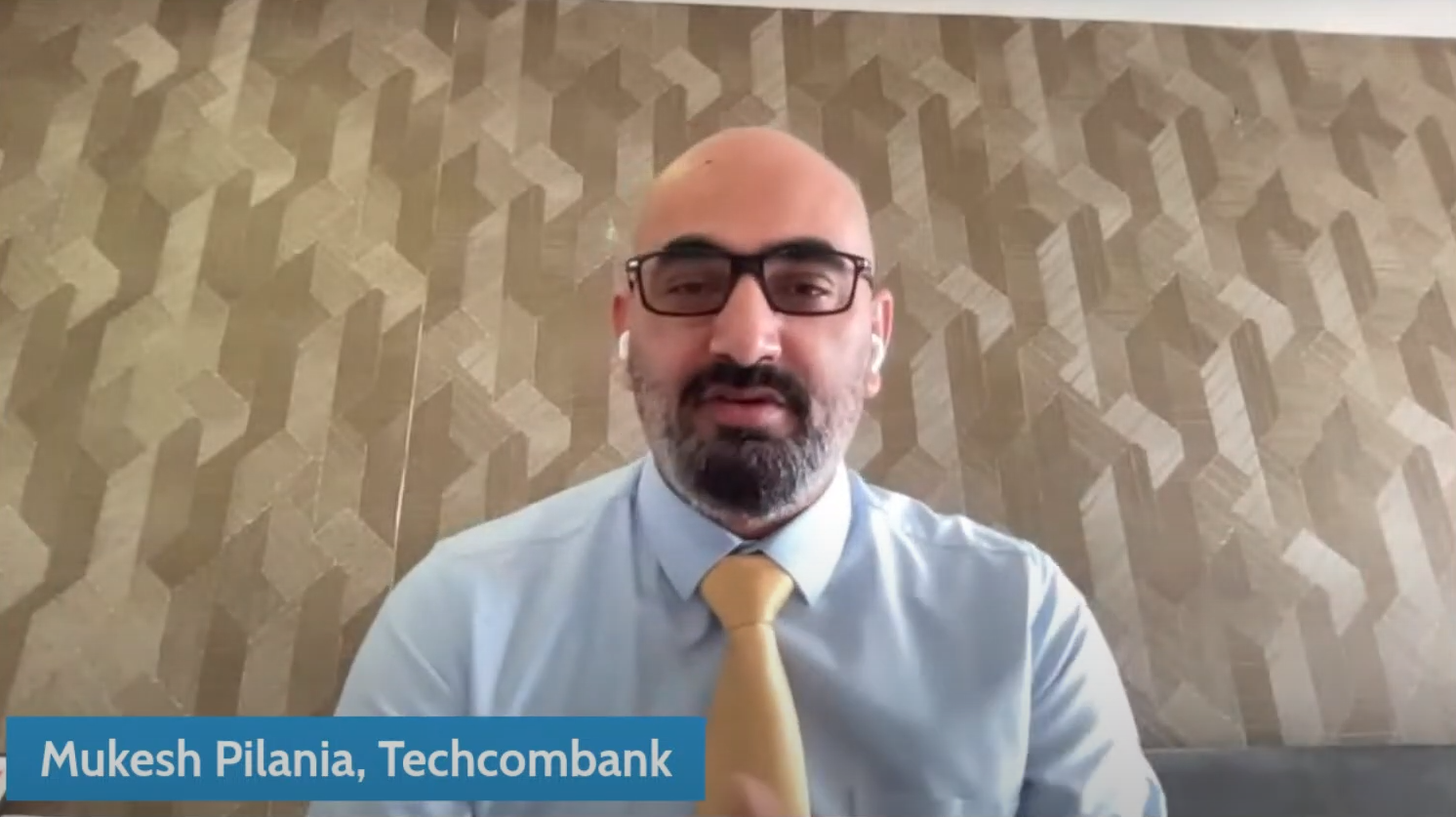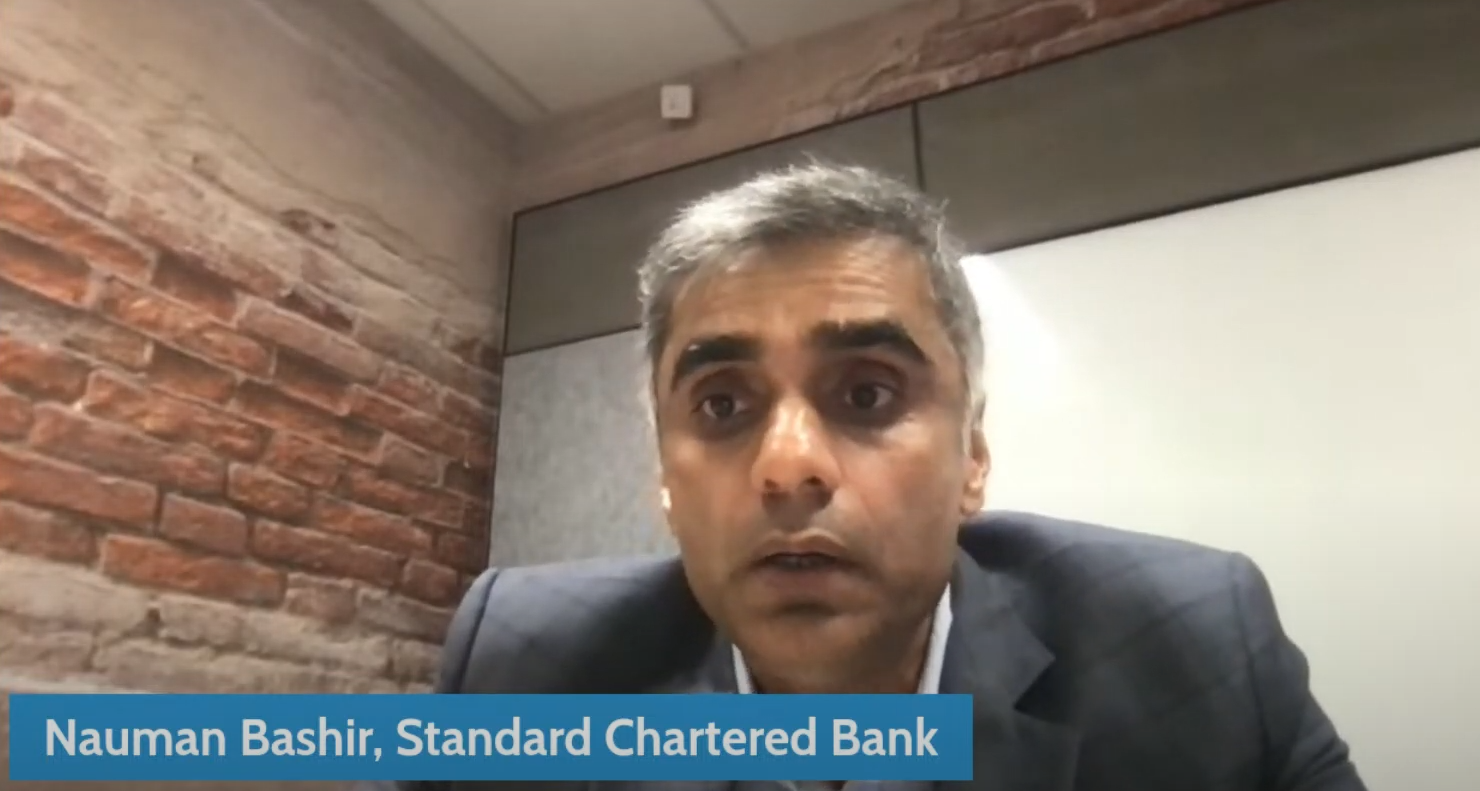Fintech
How banks can leverage transactional data for unprecedented customer engagement

Of Johanan Devanesan
May 31, 2024
In a recent Fintech Webinar Fireside Asia titled “Monetising Transactional Data in Banking with Impactful Engagement”, banking and fintech experts came together to discuss how banks can leverage their vast transactional data to drive customer engagement, increase customer lifetime value and amplify business impact.
The panel featured Colin Dinn, Chief Transformation Officer of Vietcombank; Nauman Bashir, Head of Digital Management and Customer Value at Standard charter; Mukesh Pilania, Executive Vice President and Head of Digital Banking at Techcombank; and Dorel Blitz, Vice President of Strategy and Business Development at Personetics. The discussion was moderated by Urs Bolt, a fintech and banking industry veteran.
The evolution of data use in the banking sector
Colin Dinn kicked off the discussion by tracing the evolution of data use in banking over the past few decades. He noted that before automation, banks had the richest data set thanks to personal interactions with customers. However, as automation has increased, banks have lost some of that intimate customer knowledge.
“Through automation we’ve lost a lot of that, and now we’re trying to figure out how to get it back,”
Colin said.

Colin Dinn, Head of Transformation, Vietcombank
Banks have since gone through phases where they view transactions as expenses, drive for convenience and adoption, collect transaction data, and use the data to make credit decisions.
Colin highlighted the importance of data privacy as banks advance their use of transactional data, saying:
“Data privacy is paramount. Data privacy is the overriding factor in any use of data and we will use it in the future. And it’s a governance issue that every single bank takes very, very seriously.”
Trends in the financial services industry
Nauman Bashir shared insights into trends in Singapore, which he described as “leading the way in many areas of how data is used effectively.”
He highlighted regulatory sandboxes, digital bank licenses, open banking systemAND APIs as key developments that have driven innovation and improved customer experience.
Nauman also noted the success of Trust banka digital bank launched by Standard Chartered in partnership with a local e-commerce operator, which has attracted nearly a million customers and built a strong balance sheet in just two years.

Mukesh Pilania, EVP and Head of Digital Banking, Techcombank
Mukesh Pilania discussed trends from an emerging economy perspective, highlighting the growing demand for ESG and green finance products. He also highlighted the importance of using digital solutions to improve the capabilities of offline channels and create “super relationship managers”.
Mukesh said,
“Obviously there are real-time deals, and then how can we holistically connect the entire end-to-end journey of a customer, from payments to say a wealth, and how can you deliver everything on digital.
And don’t keep digital just for end users, but also use it to enhance the capabilities of your offline channels and branches and make your relationship manager a super relationship manager by providing them with data-driven technology solutions.”
Implementation of data-driven strategies
When it comes to implementing data-driven strategies, Dorel Blitz emphasized the importance of starting with a well-defined business case and strategy.
“It’s never about technology; technology already solves most problems. It’s really about starting with defining the business case and the strategy to support it,”
Dorel said.
He also highlighted the importance of considering how banks want to deliver value to customers and what the right channels are to increase customer usage.

Dorel Blitz, Vice President of Strategy and Business Development, Peopleics
Mukesh Pilania of Techcombank agrees, adding that data quality and governance are crucial preconditions for a successful implementation.
“Imagine that any tool is only as good as the quality of the data you have. If your data isn’t clean, isn’t properly governed and structured, many of these implementations will fail.”
he warned.
Mukesh suggested starting with a pilot project, refining it based on the results, and then implementing it while continuously refining the approach.
The role of subsidiaries in a data-driven world
Speakers also discussed the role of subsidiaries in a data-driven world. Nauman Bashir emphasized that branches will continue to play an important role, particularly for high-value transactions, advisory services and relationship building.
“The value of human touch and personal interaction is extremely precious and will remain so”
He said.
Nauman noted that branches can serve as experience centers, where customers can provide feedback, participate in financial literacy workshops and exchange ideas.
Colin Dinn, Chief Transformation Officer of Vietcombank, echoed this sentiment, saying that the branch will not be closed anytime soon.
“We should never underestimate the value of a branch, because it’s where we really get that personal contact,”
He said.
Colin also questioned the concept of individual channels, arguing that banks should focus on creating a common sales and service architecture that integrates digital and data capabilities across all channels.
Collaborate with Fintech and new players
When asked about collaborating with fintechs and new players, Nauman Bashir acknowledged that while banks are not traditionally known for being open to collaboration, the situation is changing rapidly.

Nauman Bashir, head of digital and customer value management, Standard Chartered
“I think there’s so much value in collaboration that a bank alone can’t do or a partner other than themselves can do,”
He said.
“They can’t create that experience, service or product for the customer unless they come together.”
Nauman cited examples such as Trust Bank and partnership with buy now, pay later suppliers as successful collaborations that created value for customers.
The future of artificial intelligence and human capital in banking
Speakers also addressed questions about the impact of Generative AI on legacy technology issues and the future of human capital costs in banking. While recognizing the potential of AI, they cautioned against overestimating its capabilities.
“I think not in the near future. First of all, I think there’s a lot of excitement about generative AI, etc., and AI taking over the world, and then humans won’t be necessary. I think that’s a long, long way away,”
Mukesh Pilania said.
He suggested that artificial intelligence and technology will be used to improve the skills of human bankers, creating “Ironman suits” that give them knowledge and data to better serve customers.
The role of transaction data and artificial intelligence in the future of banking
As banks continue to navigate the evolving landscape of data-driven customer engagement, it is clear that transactional data has immense potential to drive business impact and improve customer experiences.
By focusing on data quality, governance and strategic implementation, and embracing collaboration with fintechs and new players, banks can unlock the power of this valuable resource to create more personalized, proactive and impactful interactions with their customers.
While technology and artificial intelligence will undoubtedly play an increasingly important role, panelists agree that the human touch provided by bankers and branches will remain essential to building trust and deepening customer relationships.
Watch the full webinar “Monetizing Transactional Data in Banking with Impactful Engagement” at Fintech Fireside Asia YouTube channel:
Get the hottest Fintech Singapore news delivered to your inbox once a month
Fintech
US Agencies Request Information on Bank-Fintech Dealings

Federal banking regulators have issued a statement reminding banks of the potential risks associated with third-party arrangements to provide bank deposit products and services.
The agencies support responsible innovation and banks that engage in these arrangements in a safe and fair manner and in compliance with applicable law. While these arrangements may offer benefits, supervisory experience has identified a number of safety and soundness, compliance, and consumer concerns with the management of these arrangements. The statement details potential risks and provides examples of effective risk management practices for these arrangements. Additionally, the statement reminds banks of existing legal requirements, guidance, and related resources and provides insights that the agencies have gained through their oversight. The statement does not establish new supervisory expectations.
Separately, the agencies requested additional information on a broad range of arrangements between banks and fintechs, including for deposit, payment, and lending products and services. The agencies are seeking input on the nature and implications of arrangements between banks and fintechs and effective risk management practices.
The agencies are considering whether to take additional steps to ensure that banks effectively manage the risks associated with these different types of arrangements.
SUBSCRIBE TO THE NEWSLETTER
And get exclusive articles on the stock markets
Fintech
What changes in financial regulation have impacted the development of financial technology?

Exploring the complex landscape of global financial regulation, we gather insights from leading fintech leaders, including CEOs and finance experts. From the game-changing impact of PSD2 to the significant role of GDPR in data security, explore the four key regulatory changes that have reshaped fintech development, answering the question: “What changes in financial regulation have impacted fintech development?”
- PSD2 revolutionizes access to financial technology
- GDPR Improves Fintech Data Privacy
- Regulatory Sandboxes Drive Fintech Innovation
- GDPR Impacts Fintech Data Security
PSD2 revolutionizes access to financial technology
When it comes to regulatory impact on fintech development, nothing comes close to PSD2. This EU regulation has created a new level playing field for market players of all sizes, from fintech startups to established banks. It has had a ripple effect on other markets around the world, inspiring similar regulatory frameworks and driving global innovation in fintech.
The Payment Services Directive (PSD2), the EU law in force since 2018, has revolutionized the fintech industry by requiring banks to provide third-party payment providers (TPPs) with access to payment services and customer account information via open APIs. This has democratized access to financial data, fostering the development of personalized financial instruments and seamless payment solutions. Advanced security measures such as Strong Customer Authentication (SCA) have increased consumer trust, pushing both fintech companies and traditional banks to innovate and collaborate more effectively, resulting in a dynamic and consumer-friendly financial ecosystem.
The impact of PSD2 has extended beyond the EU, inspiring similar regulations around the world. Countries such as the UK, Australia and Canada have launched their own open banking initiatives, spurred by the benefits seen in the EU. PSD2 has highlighted the benefits of open banking, also prompting US financial institutions and fintech companies to explore similar initiatives voluntarily.
This has led to a global wave of fintech innovation, with financial institutions and fintech companies offering more integrated, personalized and secure services. The EU’s leadership in open banking through PSD2 has set a global standard, promoting regulatory harmonization and fostering an interconnected and innovative global financial ecosystem.
Looking ahead, the EU’s PSD3 proposals and Financial Data Access (FIDA) regulations promise to further advance open banking. PSD3 aims to refine and build on PSD2, with a focus on improving transaction security, fraud prevention, and integration between banks and TPPs. FIDA will expand data sharing beyond payment accounts to include areas such as insurance and investments, paving the way for more comprehensive financial products and services.
These developments are set to further enhance connectivity, efficiency and innovation in financial services, cementing open banking as a key component of the global financial infrastructure.
General Manager, Technology and Product Consultant Fintech, Insurtech, Miquido
GDPR Improves Fintech Data Privacy
Privacy and data protection have been taken to another level by the General Data Protection Regulation (GDPR), forcing fintech companies to tighten their data management. In compliance with the GDPR, organizations must ensure that personal data is processed fairly, transparently, and securely.
This has led to increased innovation in fintech towards technologies such as encryption and anonymization for data protection. GDPR was described as a top priority in the data protection strategies of 92% of US-based companies surveyed by PwC.
Financial Expert, Sterlinx Global
Regulatory Sandboxes Drive Fintech Innovation
Since the UK’s Financial Conduct Authority (FCA) pioneered sandbox regulatory frameworks in 2016 to enable fintech startups to explore new products and services, similar frameworks have been introduced in other countries.
This has reduced the “crippling effect on innovation” caused by a “one size fits all” regulatory approach, which would also require machines to be built to complete regulatory compliance before any testing. Successful applications within sandboxes give regulators the confidence to move forward and address gaps in laws, regulations, or supervisory approaches. This has led to widespread adoption of new technologies and business models and helped channel private sector dynamism, while keeping consumers protected and imposing appropriate regulatory requirements.
Co-founder, UK Linkology
GDPR Impacts Fintech Data Security
A big change in financial regulations that has had a real impact on fintech is the 2018 EU General Data Protection Regulation (GDPR). I have seen how GDPR has pushed us to focus more on user privacy and data security.
GDPR means we have to handle personal data much more carefully. At Leverage, we have had to step up our game to meet these new rules. We have improved our data encryption and started doing regular security audits. It was a little tricky at first, but it has made our systems much more secure.
For example, we’ve added features that give users more control over their data, like simple consent tools and clear privacy notices. These changes have helped us comply with GDPR and made our customers feel more confident in how we handle their information.
I believe that GDPR has made fintech companies, including us at Leverage, more transparent and secure. It has helped build trust with our users, showing them that we take data protection seriously.
CEO & Co-Founder, Leverage Planning
Related Articles
Fintech
M2P Fintech About to Raise $80M

Application Programming Interface (API) Infrastructure Platform M2P Financial Technology has reached the final round to raise $80 million, at a valuation of $900 million.
Specifically, M2P Fintech, formerly known as Yap, is closing a new funding round involving new and existing investors, according to entrackr.com. The India-based company, which last raised funding two and a half years ago, previously secured $56 million in a round led by Insight Partners, earning a post-money valuation of $650 million.
A source indicated that M2P Fintech is ready to raise $80 million in this new funding round, led by a new investor. Existing backers, including Insight Partners, are also expected to participate. The new funding is expected to go toward enhancing the company’s technology infrastructure and driving growth in domestic and international markets.
What does M2P Fintech do?
M2P Fintech’s API platform enables businesses to provide branded financial services through partnerships with fintech companies while maintaining regulatory compliance. In addition to its operations in India, the company is active in Nepal, UAE, Australia, New Zealand, Philippines, Bahrain, Egypt, and many other countries.
Another source revealed that M2P Fintech’s valuation in this funding round is expected to be between USD 880 million and USD 900 million (post-money). The company has reportedly received a term sheet and the deal is expected to be publicly announced soon. The Tiger Global-backed company has acquired six companies to date, including Goals101, Syntizen, and BSG ITSOFT, to enhance its service offerings.
According to TheKredible, Beenext is the company’s largest shareholder with over 13% ownership, while the co-founders collectively own 34% of the company. Although M2P Fintech has yet to release its FY24 financials, it has reported a significant increase in operating revenue. However, this growth has also been accompanied by a substantial increase in losses.
Fintech
Scottish financial technology firm Aveni secures £11m to expand AI offering

By Gloria Methri
Today
- To come
- Aveni Assistance
- Aveni Detection
Artificial intelligence Financial Technology Aveni has announced one of the largest Series A investments in a Scottish company this year, amounting to £11 million. The investment is led by Puma Private Equity with participation from Par Equity, Lloyds Banking Group and Nationwide.
Aveni combines AI expertise with extensive financial services experience to create large language models (LLMs) and AI products designed specifically for the financial services industry. It is trusted by some of the UK’s leading financial services firms. It has seen significant business growth over the past two years through its conformity and productivity solutions, Aveni Detect and Aveni Assist.
This investment will enable Aveni to build on the success of its existing products, further consolidate its presence in the sector and introduce advanced technologies through FinLLM, a large-scale language model specifically for financial services.
FinLLM is being developed in partnership with new investors Lloyds Banking Group and Nationwide. It is a large, industry-aligned language model that aims to set the standard for transparent, responsible and ethical adoption of generative AI in UK financial services.
Following the investment, the team developing the FinLLM will be based at the Edinburgh Futures Institute, in a state-of-the-art facility.
Joseph Twigg, CEO of Aveniexplained, “The financial services industry doesn’t need AI models that can quote Shakespeare; it needs AI models that deliver transparency, trust, and most importantly, fairness. The way to achieve this is to develop small, highly tuned language models, trained on financial services data, and reviewed by financial services experts for specific financial services use cases. Generative AI is the most significant technological evolution of our generation, and we are in the early stages of adoption. This represents a significant opportunity for Aveni and our partners. The goal with FinLLM is to set a new standard for the controlled, responsible, and ethical adoption of generative AI, outperforming all other generic models in our select financial services use cases.”
Previous Article
Network International and Biz2X Sign Partnership for SME Financing
IBSi Daily News Analysis

SMBs Leverage Cloud to Gain Competitive Advantage, Study Shows
IBSi FinTech Magazine

- The Most Trusted FinTech Magazine Since 1991
- Digital monthly issue
- Over 60 pages of research, analysis, interviews, opinions and rankings
- Global coverage
subscribe now
-

 DeFi12 months ago
DeFi12 months agoDeFi Technologies Appoints Andrew Forson to Board of Directors
-

 Fintech12 months ago
Fintech12 months agoUS Agencies Request Information on Bank-Fintech Dealings
-

 News1 year ago
News1 year agoBlock Investors Need More to Assess Crypto Unit’s Earnings Potential, Analysts Say — TradingView News
-

 DeFi12 months ago
DeFi12 months agoSwitchboard Revolutionizes DeFi with New Oracle Aggregator
-

 DeFi12 months ago
DeFi12 months agoIs Zypto Wallet a Reliable Choice for DeFi Users?
-

 News1 year ago
News1 year agoBitcoin and Technology Correlation Collapses Due to Excess Supply
-

 Fintech12 months ago
Fintech12 months agoWhat changes in financial regulation have impacted the development of financial technology?
-

 Fintech12 months ago
Fintech12 months agoScottish financial technology firm Aveni secures £11m to expand AI offering
-

 Fintech12 months ago
Fintech12 months agoScottish financial technology firm Aveni raises £11m to develop custom AI model for financial services
-

 News1 year ago
News1 year agoValueZone launches new tools to maximize earnings during the ongoing crypto summer
-

 Videos6 months ago
Videos6 months ago“Artificial intelligence is bringing us to a future that we may not survive” – Sco to Whitney Webb’s Waorting!
-

 DeFi1 year ago
DeFi1 year agoTON Network Surpasses $200M TVL, Boosted by Open League and DeFi Growth ⋆ ZyCrypto






